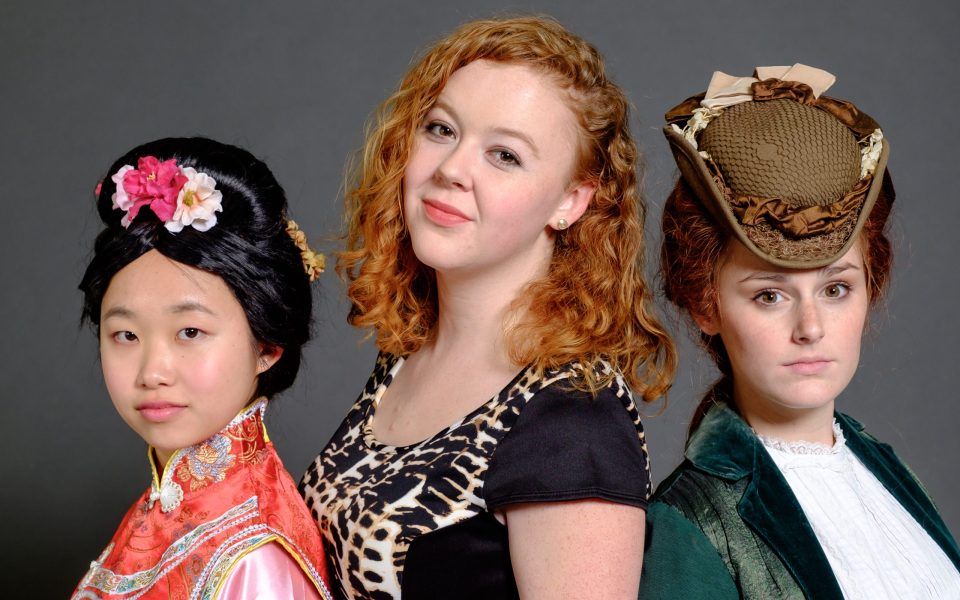From left: Suna Guo, Heather Sullivan and Lillie Burrow (l-r) star in Wake Forest University’s dark take on the comedy The Waiting Room. (photo by Ken Bennett)
A sense of foreboding sets in early in The Waiting Room at Wake Forest University, which opened last weekend and will run until Feb. 21, beginning with its promotional poster art featuring Botticelli’s “Birth of Venus,” who, upon closer inspection, has bound breasts and feet, both of which are bleeding. And hilarity ensues!
Well, not quite. It’s hard to laugh at many points of this play, which is billed as a comedy, even when the audience knows they ought to. With lines like, “Corset hurts bad, huh?” — “No, only when I breathe,” the long and horrifying history of cosmetic augmentation women have undergone in order to fit beauty standards is laid bare, to sobering rather than humorous effect.
Directed by theater department head John ER Friedenberg — “Jerf” to his students — the play features women from three different time periods each seeking a medical procedure to cure afflictions caused by their attempts to fix something deemed ugly by their cultures.
Wanda, played by senior Heather Sullivan, is a modern-day cosmetic surgery addict with a crass sense of humor who comes to the doctor seeking a new pair of silicone breast implants, only to discover that she has breast cancer. Lillie Burrow as Victoria plans to get her ovaries removed in order to cure her emotional outbursts according to late-1800s beliefs about hysteria. Forgiveness from Heaven, hailing from 17th Century China (and portrayed with comedic brilliance by Suna Guo) needs a toe reattached, having lost it from the practice of foot-binding.
There’s never any reason given for their anachronistic coexistence, but that little detail is soon swept away in the mélange of a plot. Ancient and current body modification are juxtaposed mercilessly, all three comparatively horrific in method and ridiculous in purpose.
Early on in the first act, however, it becomes apparent that this isn’t just a play about the silliness of beauty standards; it’s actually just as much of a play about cancer, though it critiques corruption in the medical industry as well. Playwright Lisa Loomer weakens her script’s strength by trying to preach to too many cultural issues, but the story is bolstered by acting that eclipses those shortcomings.
The blocking of the play did exactly what it should do by not drawing attention to itself, though a few mishaps with props broke the believability of the story on occasion, and music between scenes distractingly varied between a traditional Chinese erhu and ’80s elevator muzak, with no apparent rationale. This contrasted sharply with the smoothly executed set design by Jonathan Christman, consisting of a rotating stage and two doorways that characters would be transported through as tableaux at the ends of scenes.
Music notwithstanding, it’s impressive to have a production stacked with green freshman deliver so many striking performances. Burrow captivates as the goofy yet pitiful Victoria, her panicked naiveté made even sillier parsed in crisp, late-1800s English. To be fair, she does get to deliver the best line in the play when her husband accuses her of having a Freudian fixation on her father, swearing with the utmost gravitas: “I’ve never wanted to sleep with any man!” Her delivery is supported (literally) with excellent period costuming from Ketti Shum, including a torturous-looking corset and bustle.
Fans of the 2011 film Hysteria (or any gender studies majors) will likely be in on the joke early when Victoria first begins explaining her “condition” to Forgiveness from Heaven. Hysteria, derived from the Greek word for uterus, was believed up until the turn of the 20th Century to be a conversion disorder akin to the dubious “vapors,” symptoms of which included “erotic tendencies.”
It’s hard not to wince as Victoria describes her treatment with leeches (and where she put them) or the hysterectomy she’s waiting to have, but then again, that’s the point, as she’s discussing undergoing the procedure alongside a woman losing toes to infection from her three-inch-long bound feet and another who has a tumor in her breast worsened by her set of implants. Though their stories are set hundreds of years apart, the graphic nature of the procedures to obtain beauty (and the faux science that informs those procedures) described by each character is decidedly nauseating.
The men of the production offer a counterpoint caricature to the three women’s stories, though not at all in a flattering way. Sophomore Tyler Johnson is perfectly boorish as Larry, who, in between using his position on a hospital board to block a potential cancer cure in order to advance one that better suits his interests, occasionally picks up the phone to bark at his wife, “Sweetie, I’m in a meeting!” Johnson makes it remarkably easy to hate this character.
Junior Jason Chinuntdet’s Dr. Douglas is much more sympathetic as a bumbling physician. An office scene with his nurse Brenda, portrayed with gravity and wit by junior Justice von Maur, is possibly the most powerful of the play, culminating in his loudly accusing the calm Brenda of being hysterical as he loses his temper.
The irony can’t be missed that women across cultures and centuries have been altering their appearance as long as we all can collectively remember; the cord of irony is finally snapped by Wanda fiercely shouting from a hospital cot, “It’s my body! My body!” in a chilling thesis statement of the play. The anti-body-modification message was perhaps more groundbreaking in 1994 when the play was first performed, but is still powerful and disquieting enough to leave a lingering impression long after leaving the Scales Theater.
Join the First Amendment Society, a membership that goes directly to funding TCB‘s newsroom.
We believe that reporting can save the world.
The TCB First Amendment Society recognizes the vital role of a free, unfettered press with a bundling of local experiences designed to build community, and unique engagements with our newsroom that will help you understand, and shape, local journalism’s critical role in uplifting the people in our cities.
All revenue goes directly into the newsroom as reporters’ salaries and freelance commissions.





Leave a Reply